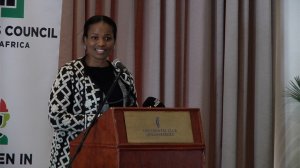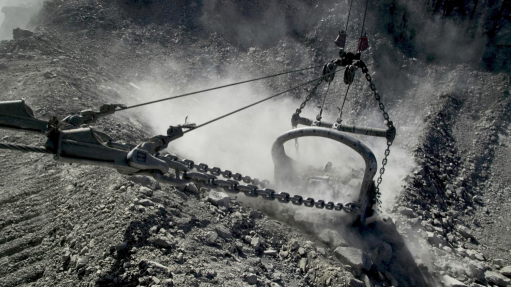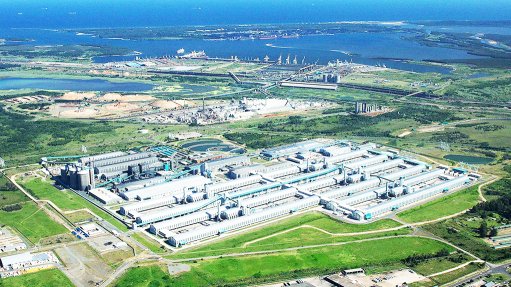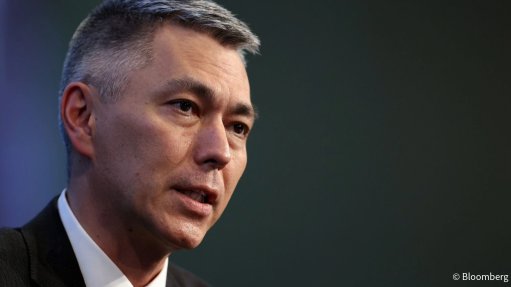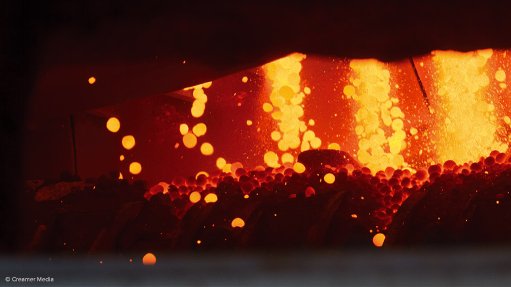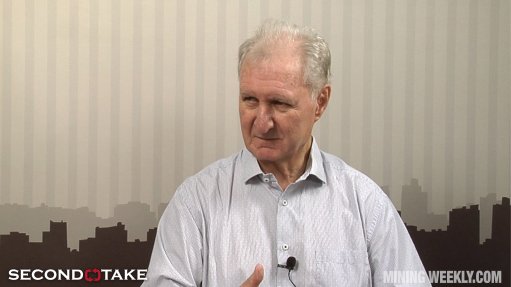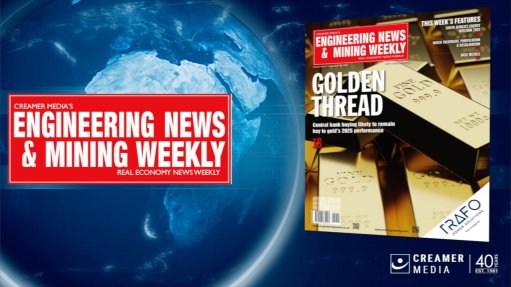Further drive needed to push gender transformation in the mining industry

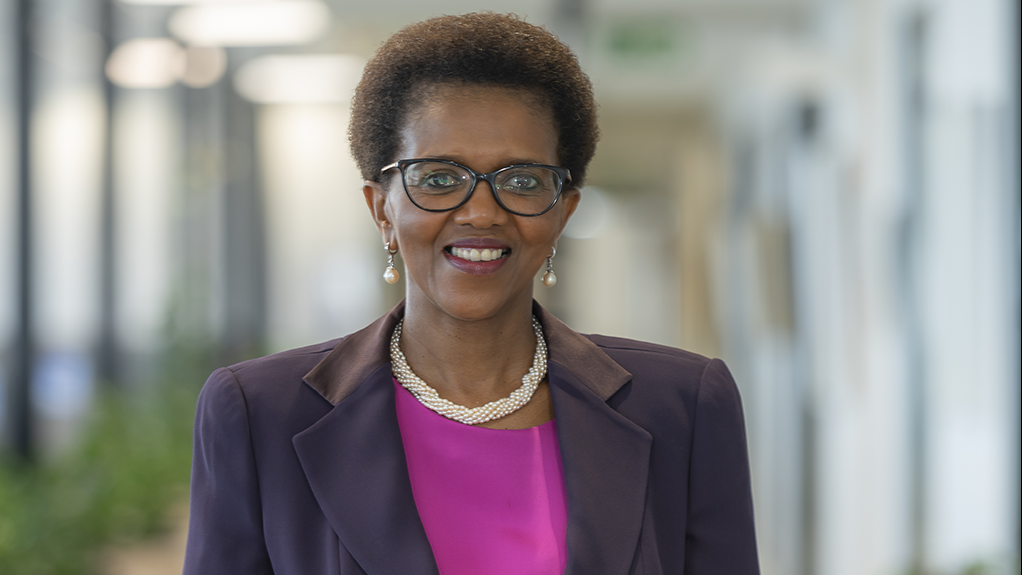
National Development Fund Venture Division executive Zama Khanyile outlines interventions that the organisation is undertaking to further gender transformation in the country’s industries, including the mining sector.
Minerals Council president and Women in Mining Leadership Forum chairperson Nolitha Fakude
There has been some progress in the necessary drive to transform the mining industry in terms of gender parity; however, much work still remains to be done, and pivotal to this will be collaboration, mining companies supporting programmes and providing mentorship and an understanding that mining can be a catalyst for engendering sustainable communities.
This was noted during the Minerals Council South Africa’s Women in Mining Conference, held on June 22, in Johannesburg.
Minerals Council president and Women in Mining Leadership Forum chairperson Nolitha Fakude emphasised that organisations needed to create an enabling environment for women to thrive internally, but also to participate in the broader industry ecosystem in a meaningful way.
She said the aim must be for this to be done beyond just adhering to compliance requirements.
Fakude highlighted that, over the past decade, a considerable effort had been made to increase gender representation and foster transformation in mining, which had historically been male-dominated with women only allowed to work legally in the sector since 1996.
She emphasised that the gender parity agenda needed to be pushed even further, with the industry employing 72 000 women out of a workforce of 550 000, making it still largely untransformed. However, this was an increase since 2019, when 20 000 women were employed, Fakude outlined.
She pointed out that this ratio was not reflective of the country’s demographics nor of the students that were enrolling and graduating from mining-related courses.
“We all know that gender equality is a human right, and it is a business imperative. There is no longer any debate about the need to transform nor the urgency to implement impactful policies and procedures that will move the data significantly towards a fully transformed mining industry,” she emphasised.
“However, in seeking to transform our industry, we cannot ignore the many social and economic burdens that still stifle society today, the burdens that still deeply impact the host communities in which we operate, and from whom our colleagues and members of staff come, burdens that are as a result of long difficulties that affected the country, but also due to the systemic and cultural challenges that result in deep unemployment and the scourge of gender-based violence,” Fakude said.
She noted, therefore, that as gender equity continued to be pursued in society generally, there must be a similar, urgent push for this in the mining sector.
Fakude said that focus on equity would push the dialogue on transformation forward and would significantly bolster diversity and inclusion initiatives across the board.
To make real the objectives of pillar five under the National Strategic Plan on gender-based violence, there was a need to ensure that women were specifically empowered to make decisions for their safety and well-being, she mentioned.
Fakude emphasised that the mining industry and companies needed to come up with actionable and sustainable initiatives that made an impact.
The mining industry, through procurement and enterprise development initiatives, had the financial power and the reach to unlock individuals’ income-generating capacity, and to increase education and the transfer of much-needed skills, Fakude posited.
She noted that support for women-owned businesses had a multiplier effect.
Fakude called for a focus on transformation that impacted the total manual labour chain. “That is the equity we wish to see in the mining industry.”
Fakude said that the industry had been deliberate about procuring from local suppliers in its hosting communities, especially black-owned and women-owned suppliers.
Fakude outlined that the mining and quarrying sector spent R504-billion in 2022 on buying goods and services, and that the mining industry stove to allocate at least 60% of its yearly procurement expenditure on empowered companies, which included black-owned, women-owned and youth-owned companies.
The industry also spent more than 1% of its net profit after tax on community development projects yearly, she said.
“In order to continue on this growth trajectory, it is important to have open dialogue around where the real opportunities are, the challenges experienced by our peers in providing these programmes, as well as highlighting initiatives, to collaborate and scale up our influences,” Fakude emphasised.
She also shared statistics showing the sheer scale of gender-based violence facing the country, with these likely to not represent the true amount, given that many cases go unreported.
Fakude said that while mining companies can and did implement policies inside mine bases to address this, she said they must become more active in their host communities from which they employ staff.
To this end, the Minerals Council and its members, which represented 90% of the mining workforce, launched a partnership last December with the National Prosecuting Authority, and the Gender Based Violence and Femicide Response Fund to support gender-based violence response centres, she noted.
Fakude added that there was a need to work together with external stakeholders on this matter.
“Through mining companies' procurement spend, we can contribute to women's economic empowerment in our host communities by supporting women-owned businesses. Further, education is key to empowerment of women and careers,” Fakude outlined.
To this end, the mining sector spent more than R5-billion on human resources development in 2002, with a further R1.7-billion paid through the Skills Development Levy, Fakude said.
She highlighted that research last year had shown that more women were interested in science, technology, engineering and mathematics courses, and mining courses, in higher education. However, a gender analysis in the large-scale mining sector in the country showed that although there were more women and girls entering mining course streams, retention in the industry was low, Fakude pointed out.
Therefore, she noted that there was a need for more visible role models in this regard.
Comments
Press Office
Announcements
What's On
Subscribe to improve your user experience...
Option 1 (equivalent of R125 a month):
Receive a weekly copy of Creamer Media's Engineering News & Mining Weekly magazine
(print copy for those in South Africa and e-magazine for those outside of South Africa)
Receive daily email newsletters
Access to full search results
Access archive of magazine back copies
Access to Projects in Progress
Access to ONE Research Report of your choice in PDF format
Option 2 (equivalent of R375 a month):
All benefits from Option 1
PLUS
Access to Creamer Media's Research Channel Africa for ALL Research Reports, in PDF format, on various industrial and mining sectors
including Electricity; Water; Energy Transition; Hydrogen; Roads, Rail and Ports; Coal; Gold; Platinum; Battery Metals; etc.
Already a subscriber?
Forgotten your password?
Receive weekly copy of Creamer Media's Engineering News & Mining Weekly magazine (print copy for those in South Africa and e-magazine for those outside of South Africa)
➕
Recieve daily email newsletters
➕
Access to full search results
➕
Access archive of magazine back copies
➕
Access to Projects in Progress
➕
Access to ONE Research Report of your choice in PDF format
RESEARCH CHANNEL AFRICA
R4500 (equivalent of R375 a month)
SUBSCRIBEAll benefits from Option 1
➕
Access to Creamer Media's Research Channel Africa for ALL Research Reports on various industrial and mining sectors, in PDF format, including on:
Electricity
➕
Water
➕
Energy Transition
➕
Hydrogen
➕
Roads, Rail and Ports
➕
Coal
➕
Gold
➕
Platinum
➕
Battery Metals
➕
etc.
Receive all benefits from Option 1 or Option 2 delivered to numerous people at your company
➕
Multiple User names and Passwords for simultaneous log-ins
➕
Intranet integration access to all in your organisation


